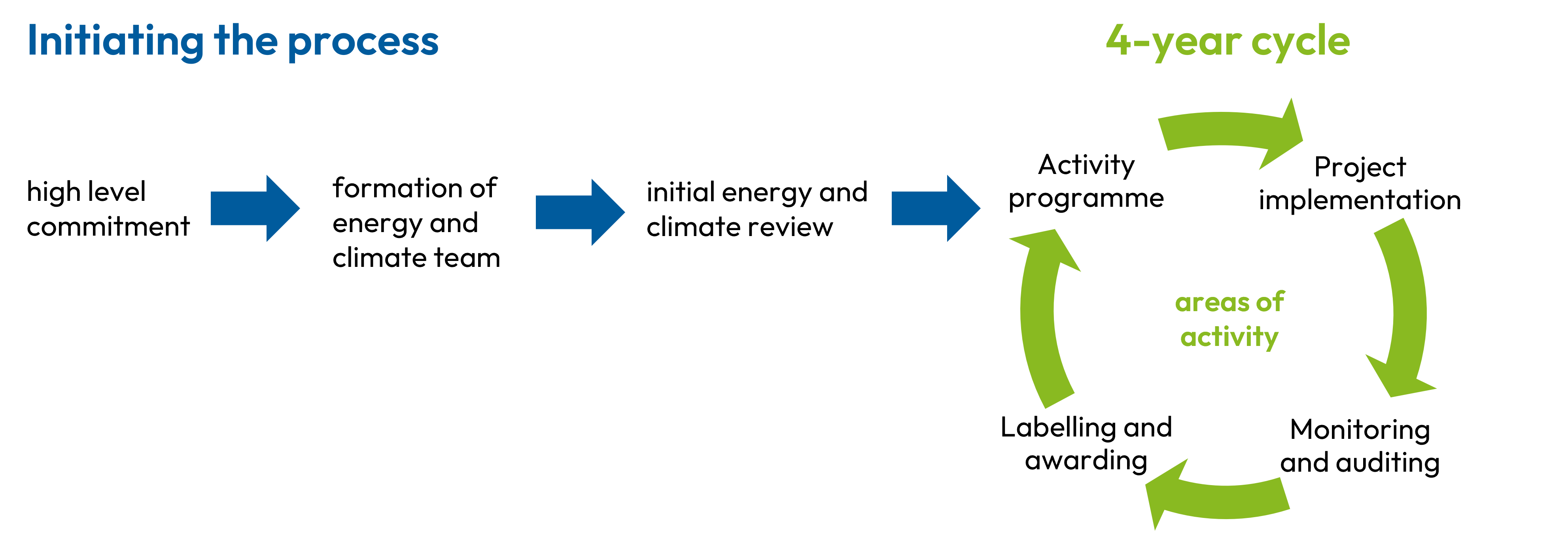Process
The European Energy Award (eea) is based on a process of continuous improvement, which ensures that local governments continually increase their energy efficiency, use of renewable energies and sustainable mobility practices.
In contrast to current management systems for business and industry, the eea integrates two additional key factors for success:
- External advisors: Each local government is supported by an external eea advisor, who provides technical and organisational assistance throughout the entire eea process.
- Motivation for continuous improvement: As part of a four year award cycle, local governments are regularly assessed and rated in terms of the eea's areas of activity. This process provides an incentive for continuous improvement, as the bar for successful assessment is raised constantly as new technologies become available and policies evolve.
Initiating the process
High level commitment
Local governments take a top-level decision to engage with the eea process. They set aside staff and resources for this purpose and register with the national/regional eea organisation before they start the process.
Energy & climate team
The local government creates a working group responsible for carrying out the eea process and implementing the energy & climate activity programme. This energy & climate team comprises all key players in energy and climate at the local government level, i.e. various administrative and policy departments as well as committed residents, stakeholders etc., as applicable.
The national/regional eea organisation refers the municipality to an accredited eea advisor, who provides technical and organisational support throughout the entire eea process.
Initial energy and climate review
Using the eea catalogue of measures and the online eea Management Tool (EMT), the energy & climate team and the eea advisor collaboratively review which measures within the local government’s scope of action have already been implemented and identify potential areas that still provide potential for improvement. Based on this initial energy and climate review, a report is created that sets out the local government’s individual profile of strengths and weaknesses. Ideas for activities are documented for the activity programme.
4-year cycle
Create activity programme
Based on these first findings, the energy & climate team prepares an activity programme, which defines a binding programme for the subsequent 3-5 years and sets out responsibilities and deadlines addressing the following questions:
- What do we want to do in the next four years? Which goals do we want to achieve? Which measures does this involve?
- When do we want to do them?
- Who exactly is responsible for initiating and implementing activities respectively?
- What are the costs (internal and external, single and annual costs)?
This activity programme provides a clear overview of all energy and climate policy activities and needs to be approved by the local government.
Project implementation
The activities defined in the activity programme are implemented by policymakers and the administration as well as private companies and individuals.
Monitoring and auditing
Annual, internal audit
The energy & climate team and the eea advisor conduct an annual, internal audit in order to review the implementation of activities and establish whether goals have been achieved and targets reached.
External audit (every four years)
If the internal audit shows that a local government actively utilises at least 50% of its scope of action in energy and climate policy, the local authority progresses to an external audit, which must be completed every four years.
Labelling and awarding


Once both the eea auditor and the national eea committee have confirmed the municipality’s exemplary energy and climate policy and implementation, based on the results of the external audit, the local authority is credentialled under either the European Energy Award (implementation of 50% of the scope of action) or the European Energy Award Gold (implementation of 75% of the scope of action). The eea recognises newly labelled European Energy Gold municipalities during an annual festive award ceremony.


